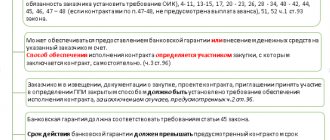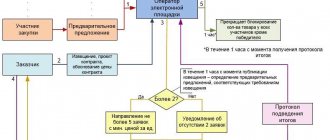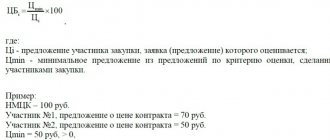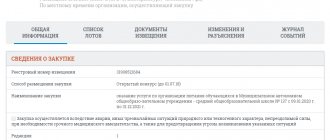A tender participant sooner or later faces dumping in government orders. The phenomenon of dumping itself has existed in the field of tenders for a very long time, almost since the emergence of the institution of public procurement in Russia. The concept of “anti-dumping measures” in government orders appeared not so long ago, namely after the adoption of 44-FZ. In Law No. 94-FZ, which was in force before 44-FZ, there was no such concept. At the same time, in practice, of course, there was dumping in government orders, but the state made no attempt to combat this phenomenon legislatively. What is “dumping” in government orders today and what methods are used to combat this phenomenon? Let's try to figure it all out!
What is dumping in government orders?
The word dumping is borrowed from the English dumping, which means dumping (selling at artificially low prices). Most often, dumping prices are lower than market prices and even lower than production costs. To understand the nature of this phenomenon, let’s look at the reasons for using dumping in tenders: 1. The supplier’s entry into a market that has already been divided and there is no other way to get into it. 2. Receiving an order from a specific customer in order to begin cooperation with this customer for the purpose of upselling related services, works, as well as entering into larger contracts. 3. Obtaining new contracts and obtaining the necessary qualifications to participate in major competitions and requests for proposals. 4. Playing according to the rules established by the state, where the price indicator is the most important and in most cases decisive in government procurement.
What all these reasons have in common is that the supplier, working at a loss or zero, plans to make a profit or some kind of preferences in the future. In addition, we should not forget about Russian reality. At the moment, the government has created a public procurement system in which the supplier who offers the lowest price has a greater chance of winning. This is true both for auctions and for competitions and other procurement methods. In the vast majority of purchases, the significance coefficient is higher for the “Price” criterion than for other evaluation criteria. Despite the fact that the state has created conditions for the development of dumping in government orders, it has also created anti-dumping measures to combat this phenomenon. Let's take a closer look at this tool.
Anti-dumping measures under 44 Federal Laws: what are they?
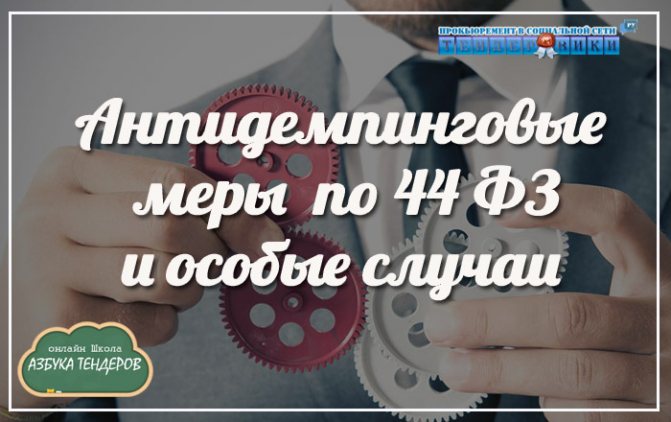
In 44-FZ, dumping is understood as a reduction in a participant’s price offer by 25% or more from the initial (maximum) contract price. That is, if the purchase limit is 1,000,000 rubles and the participant’s price offer is 750,000 rubles or more, then such an offer is recognized as dumping; if the supplier offers 750,001 rubles, then by law this is not dumping. Did you catch the fine line? One ruble or even one kopeck can influence whether the proposed price is recognized as dumping or not. Of course, this approach is formal and has an indirect relation to the market. The government procurement market has its own rules and these rules are 44-FZ. Let's look at anti-dumping measures under Federal Law 44 in more detail.
Two situations are possible:
Option No. 1 Price (NMC) of purchase is more than 15 million rubles. In this case, according to Part 1 of Art. 37 44-FZ, if the price of the winner of the purchase is dumped and reduced by 25% or more, then the customer enters into a contract with such a participant only after the winner provides contract security with a coefficient of 1.5. But in this case, the amount must be no less than the amount of the advance (if the advance is provided for in the procurement documentation and in the draft contract). That is, the procurement participant, offering a price of 25% or lower than the price from the NMC, must be ready, in case of victory, to provide contract security of 1.5 higher. The participant can choose to provide security for the contract, either in the form of a bank guarantee or by transferring funds to the customer’s account. Of course, most often the supplier chooses security in the form of a bank guarantee. Option No. 2 Purchase price (NMC) less than 15 million rubles. In this case, the procurement participant has a choice: - provide contract security with a coefficient of 1.5 (as in the option above) - provide as part of the application documents confirming the integrity of the supplier as of the date of application.
IMPORTANT: documents on good faith must be submitted as part of the application for the competition, that is, before the winner is determined. If you participate in an auction, such documents are provided along with the signed contract.
Anti-dumping measures
Article 37 provides two main methods of combating artificial undervaluation:
- Thorough verification of the supplier's reliability.
- The need for increased financial support.
Anti-dumping measures are applied in public procurement practice in the following cases:
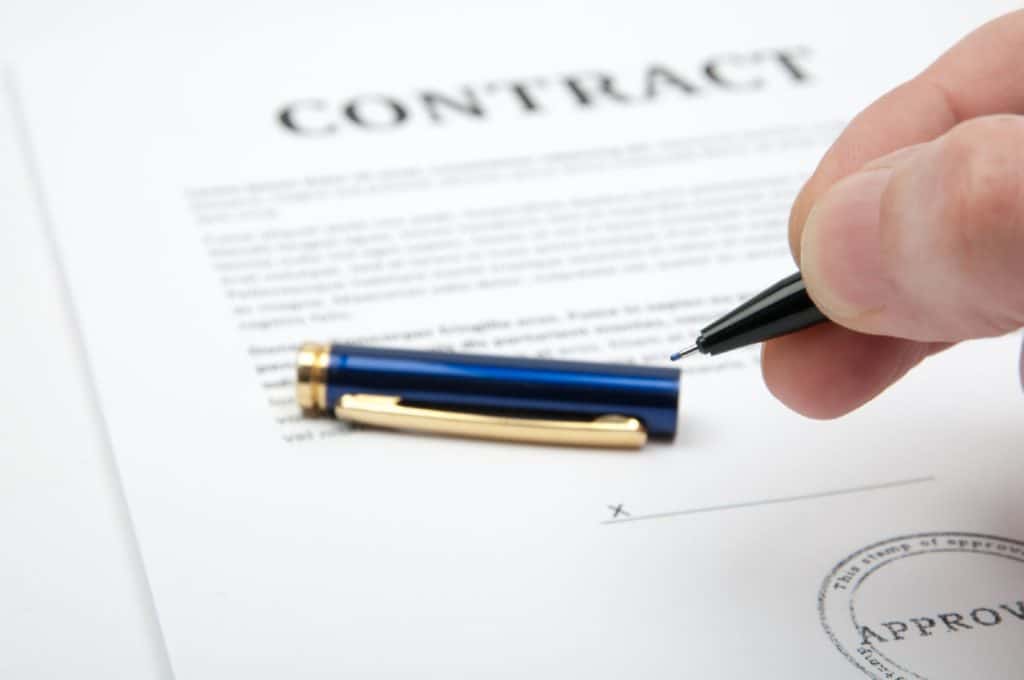
- If the initial contract price is less than 15 million rubles. , and one of the participants makes a price offer below 25% of the cost (Part 2 of Article 37 of Federal Law-44).
- If the initial contract price is more than 15 million rubles. , and one of the participants makes a price offer below 25% of the initial maximum cost (Part 1 of Article 37 of the Federal Law No. 44).
In these situations, to avoid dumping, the participant will need to additionally indicate his reliability. With the contract value within 15 million rubles. The participant has two options:
- He can provide additional information about himself . In particular, about previously concluded and successfully completed contracts.
- Or pay an increased amount of state security (1.5 times more than the amount of the guarantee under the tender documentation) - this method for purchases worth less than 15 million rubles. rarely used. It is worth noting that if the contract provides for the payment of an advance, then the security provided must be greater than the advance.
If the contract involves a cost of over 15 million rubles, then the contractor will be able to prove its reliability only by providing an increased amount of security. If the contract is not fulfilled, the specified amount is lost by the participant. In this case, no additional documents are required.
According to Part 6 of Art. 37 interim measures must be submitted by the supplier before the conclusion of the transaction. Failure to comply with this requirement will be perceived as evasion of the contract, information about which is entered into the register.
Information confirming the integrity of the supplier.

Let's consider what is meant by the “good faith” of the supplier” and supporting information. The integrity of the supplier is understood as the confirmed fact of successful execution of contracts with government customers. That is, such contracts must be completed and information about such contracts must be contained in the register of contracts. In addition, the conditions for the statute of limitations of such contracts, the number and the presence or absence of penalties must be met: Option No. 1: 3 or more contracts within 1 year before the date of application, without penalties. Option No. 2: 4 or more contracts within 2 years before the date of application, 75% of contracts without penalties. Option No. 3: 3 or more contracts within 3 years before the date of application, without penalties. At the same time, the price of one executed contract must be at least 20% of the participant’s price offer in the procurement procedure.
IMPORTANT: Please note that contracts confirming good faith must be included in the register of contracts. The fact that such a contract has been entered into the register must be verified independently. Contracts that are not included in the register of contracts cannot be used by participants as information confirming good faith. If the concluded contract is not in the register, contact the customer to clarify the reasons. Entering contracts into the register is the responsibility of the customer, who also bears administrative responsibility.
In practice, information confirming good faith can be presented by the supplier in the form of a certificate with a list of contracts that meet the requirements of Options No. 1, 2 or No. 3, which we discussed above. In such a certificate, the procurement participant can also indicate a link to entries in the register of contracts. To confirm the information, the supplier can attach printouts from the register of contracts, as well as copies of executed contracts and acts (the participant must provide a certificate, the rest is at his discretion).
In some cases, the customer may recognize information confirming good faith as unreliable if: - the participant provides information on good faith for unfinished contracts - the information provided on contracts confirming good faith is not in the register of contracts - the requirements for the number of confirming contracts, terms, absence of penalties are not met (in accordance with options 1,2,3 discussed above)
This situation can have far-reaching consequences for the supplier, with the participant being included in the register of unscrupulous suppliers in the event of participation in an electronic competition. If the customer reveals false information in an open competition, the participant will get off with rejection of the application.
Documents to confirm the reliability of the supplier
Documents that could indicate the reliability of the supplier may include:
- Information from the register of contracts , which indicates the conscientious fulfillment of his obligations in previous government procurements (the period of 1-3 years before the conclusion of the contract is taken into account).
- Information about the absence of penalties and interest against the supplier.
In Part 3 of Art. 37 FZ-44 specifies the conditions for certifying the reliability of the company. She must provide information from the relevant register:

- 3 or more contracts in the last year before submitting the application (without penalties or fines);
- 4 or more contracts over the last 2 years (75% of them should not involve penalties) or 3 or more flawlessly executed contracts over the last 3 years.
Moreover, the price of each contract should not be less than 20% of the value of the contract.
Thus, if a company is new to the public procurement market, then it will be very difficult to justify why it agreed to such a significant price increase and therefore it will probably be refused a contract (unless it has significant financial resources to pay the increased amount collateral).
Only suppliers who have been working in the government procurement market for a long time and have successfully completed contracts over the past 1-3 years have a chance to rehabilitate themselves and prove their reliability.
When a company participates in an auction, additional documents on reliability are requested from it after the winner is announced.
If the supplier company participates in the competition, then the documents are included in the general composition of the competition documentation. When the price is reduced by 25% and the documents are not provided, such an application for participation is automatically rejected. In this case, a protocol is drawn up on the reasons for the rejection of the application, which is given to the participant to become familiar with.
Anti-dumping measures under 44 Federal Laws and special cases.
Option No. 1: If the Customer holds a competition to carry out research, development or technological work, then the tender documentation may provide for various criteria for evaluating applications with a price reduction of 25% or more from the NMC and less than 25% from the NMC . For example, a participant in such a competition reduces the price by 25% or more, in this case the Customer lowers the significance coefficient for the price proposal and sets it equal not to 60%, but to 30%; for assessing qualifications, the coefficient will become, for example, not 40%, but 70% . Thus, the application of the “dumping” participant will be evaluated in such a way that it becomes unprofitable to offer a lower price, since the participant in this case is guaranteed to score fewer points. These figures are given as an example and it is natural that the customer must specify in the procurement documentation the significance factors and the conditions under which they will be applied.
Option No. 2: If the customer purchases goods for life support (food, first aid, fuel, etc.), then the participant, in addition to 1.5 times the contract security (or information confirming good faith), must justify the price reduction proposals by submitting: - a letter of guarantee from the manufacturer (with the price and quantity of goods) - documents that confirm the fact that the participant in the procedure has the goods - other documents
Option #3. Anti-dumping measures in some cases cannot be applied at all, for example, in the case of the purchase of drugs that are included in the list of necessary and essential drugs (such a list is approved by the Government of the Russian Federation). But the price of medicines should be reduced by no more than 25% relative to the maximum selling price registered in accordance with the legislation of the Russian Federation.
Option No. 4: Anti-dumping measures are also not applied if the customer does not establish a requirement to ensure the performance of the contract. Establishing contract security requirements is the responsibility of the customer, and in some cases the customer has the right not to establish contract security. In this case, the supplier does not need to provide contract security, provide information confirming good faith as part of the application, or provide contract security with a coefficient of 1.5.
Article 37. Anti-dumping measures during a tender and auction
1. If, during a competition or auction, the initial (maximum) contract price is more than fifteen million rubles and the procurement participant with whom the contract is concluded offers a contract price that is twenty-five percent or more lower than the initial (maximum) contract price, or offers the sum of prices of units of goods, work, services, which is twenty-five percent or more lower than the initial sum of prices of these units, the contract is concluded only after such participant provides security for the performance of the contract in an amount exceeding one and a half times the amount of security for the performance of the contract specified in the documentation for the contract competition or auction, but not less than the amount of the advance (if the contract provides for the payment of an advance).
2. If, during a competition or auction, the initial (maximum) contract price is fifteen million rubles or less and the procurement participant with whom the contract is concluded offers a contract price that is twenty-five percent or more lower than the initial (maximum) contract price, or offers the sum of prices of units of goods, work, services, which is twenty-five percent or more lower than the initial sum of prices of these units, the contract is concluded only after such participant provides security for the performance of the contract in the amount specified in part 1 of this article, or information confirming the good faith of such participant in accordance with Part 3 of this article, with the simultaneous provision by such participant of contract performance security in the amount of contract performance security specified in the procurement documentation.
3. Information confirming the integrity of a procurement participant includes information contained in the register of contracts concluded by customers and confirming the execution by such participant within three years before the date of filing an application for participation in the procurement of three contracts (taking into account succession) executed without applying to such participant is subject to penalties (fines, penalties). In this case, the price of one of such contracts must be no less than twenty percent of the initial (maximum) contract price specified in the notice of procurement and procurement documentation.
4. In the case of an open tender, a tender with limited participation, a two-stage tender, a closed tender, a closed tender with limited participation, a closed two-stage tender, the information provided for in Part 3 of this article is provided by the procurement participant as part of an application for participation in an open tender, a tender with limited participation, two-stage competition, closed competition, closed competition with limited participation, closed two-stage competition. The procurement commission rejects such an application if this information is found to be unreliable. The decision to reject such an application is recorded in the protocol for determining the supplier (contractor, performer), indicating the reasons for the rejection of such an application, and is brought to the attention of the procurement participant who sent the application no later than the working day following the day of signing the specified protocol. If the procurement participant, in the case provided for in Part 2 of this article, does not provide information confirming his good faith in accordance with with part 3 of this article, a contract with this participant is concluded after he provides contract performance security in an amount one and a half times greater than the amount of contract performance security specified in the procurement documentation.
5. In the case of an open tender in electronic form, a tender with limited participation in electronic form, a two-stage tender in electronic form, an auction, the information provided for in Part 3 of this article is provided by the procurement participant when sending a signed draft contract to the customer. If such participant, recognized as the winner of the competition or auction, fails to comply with this requirement or the procurement commission recognizes the information provided for in Part 3 of this article as unreliable, the contract with such participant is not concluded and he is recognized as having evaded concluding the contract. In this case, the decision of the procurement commission is formalized in a protocol, which is posted by the customer in the unified information system no later than the working day following the day of signing the specified protocol.
6. The security specified in parts 1 and 2 of this article is provided by the procurement participant with whom the contract is concluded before its conclusion. A procurement participant who fails to comply with this requirement is deemed to have evaded concluding the contract. In this case, the procurement participant’s evasion from concluding a contract is documented in a protocol, which is posted in a unified information system and brought to the attention of all procurement participants no later than the business day following the day of signing the specified protocol.
7. When holding competitions for the purpose of concluding contracts for the performance of research, development or technological work, the provision of consulting services, the customer has the right to establish in the competition documentation different values of the significance of the criteria for evaluating applications for cases where a participant in the competition submits an application containing a proposal for the price of the contract, which:
1) up to twenty-five percent below the initial (maximum) contract price;
2) twenty-five percent or more below the initial (maximum) contract price.
8. In the cases provided for in paragraph 2 of part 7 of this article, the value of the significance of such a criterion as the contract price is set equal to ten percent of the sum of the significance values of all criteria for evaluating applications.
9. If the subject of the contract, for the conclusion of which a competition or auction is held, is the supply of goods necessary for normal life support (food, means for providing emergency, including specialized emergency, emergency or emergency medical care, medicines, fuel), the procurement participant who proposed the contract price, the sum of prices of units of goods is twenty-five or more percent lower than the initial (maximum) contract price, the initial sum of prices of units of goods, along with the requirements provided for in this article, is obliged to provide the customer with a justification for the proposed contract prices, the sum of prices of units goods, which may include a letter of guarantee from the manufacturer indicating the price and quantity of the goods supplied (except if the quantity of goods supplied cannot be determined), documents confirming the availability of goods from the procurement participant, other documents and calculations confirming the ability of the procurement participant to carry out supply of goods at the proposed price, the sum of prices of units of goods.
10. The justification specified in part 9 of this article is presented:
1) a procurement participant who proposed a contract price, the sum of prices of goods units is twenty-five percent or more lower than the initial (maximum) contract price, the initial sum of prices of goods units, as part of an application for participation in an open tender, a tender with limited participation, a two-stage tender, closed competition, closed competition with limited participation, closed two-stage competition. If such a participant fails to comply with this requirement or the procurement commission recognizes the proposed contract price or the sum of unit prices of goods as unreasonable, the application of such participant is rejected. The specified decision of the procurement commission is recorded in the protocol of consideration and evaluation of applications for participation in the competition or consideration of a single application for participation in the competition;
2) by the procurement participant with whom the contract is concluded, when sending a signed draft contract to the customer during an open tender in electronic form, a tender with limited participation in electronic form, a two-stage tender in electronic form, or an auction. If such a participant fails to comply with this requirement, he is recognized as having evaded concluding the contract. If the procurement commission recognizes the proposed contract price, the sum of prices of units of goods as unreasonable, the contract is not concluded with such a participant and the right to conclude a contract passes to the procurement participant who offered the same contract price, the sum of prices of units of goods as the winner of this competition or auction or a contract price proposal which contains the best conditions for the contract price, following the conditions proposed by the winner of this competition or auction. In these cases, the decision of the procurement commission is formalized in a protocol, which is posted in a unified information system and brought to the attention of all procurement participants no later than the working day following the day of signing the specified protocol.
11. If the winner of a tender or auction is recognized as having evaded concluding a contract, the procurement participant with whom the contract is concluded in accordance with the provisions of this Federal Law shall be subject to the requirements of this article in full.
12. The provisions of this article do not apply if, when purchasing medicines that are included in the list of vital and essential medicines approved by the Government of the Russian Federation, the procurement participant with whom the contract is concluded offers the price of all purchased medicines, reduced by no more than than twenty-five percent relative to their maximum selling price registered in accordance with the legislation on the circulation of medicines.
13. Payment of an advance payment for the execution of a contract concluded with a procurement participant specified in parts 1 or 2 of this article is not allowed.
Was there dumping?
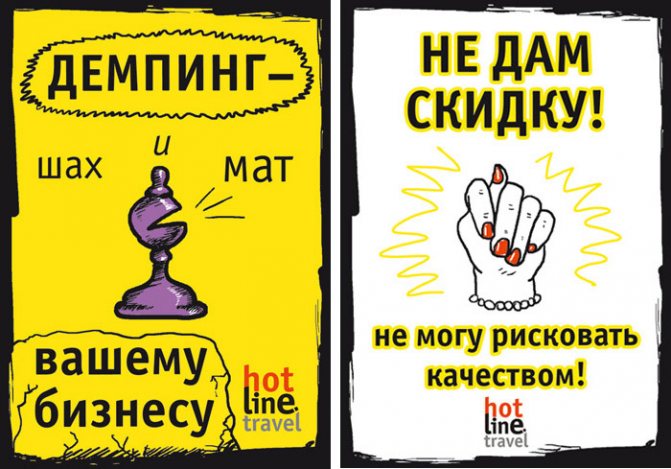
We have examined in detail the anti-dumping measures under Federal Law 44, examined in all nuances the integrity of the supplier, and ways to confirm integrity. Now let's ask ourselves how effective are these measures proposed by the authors of 44-FZ? The fact is that the starting point for determining dumping or non-dumping price is the initial maximum contract price (IMC). But, as NMC practice shows, the customer can formulate and justify absolutely any price, that is, this is not a market price. If the NMC is 1,000,000, this does not mean at all that the real cost of goods, works, services is the same, that is, 1,000,000 rubles. Naturally, the customer is interested in ensuring that the procurement procedure takes place. Therefore, it is beneficial for the customer to form an NMC above the actual cost. This situation with the formation of the NMC is also beneficial for the supplier, who, by participating in the procurement, has the opportunity to “reduce” the price and compete for the order. Thus, we can conclude that the supplier’s price reduced by 25% or more from the NMC may not always be truly dumping. The mechanism that is laid down in 44-FZ to combat dumping cannot be called effective and thoughtful.
But it should also be noted that the customer himself can create conditions for combating dumping, for example, by choosing a procurement procedure in which it is possible to set a significance coefficient at a price of 30%. As practice shows, the customer himself is not always interested in fighting dumping, since in today's unstable realities the lowest contract price is the most important factor when choosing a supplier.
It should also be understood that too low a price may cause poor quality of the goods, works and services supplied. Customers and suppliers should try to look for and find a middle ground in this difficult issue.
Where does dumping occur?
Proponents of dumping successfully adapt the techniques used to any form of procurement:
- Requests for quotations and auctions.
When conducting requests for quotations and auctions, the most commonly used type of dumping is price selection. The winner is the company that offers the product at the lowest price.
- Open tenders and requests for proposals.
When purchasing in these forms, the winner is determined by both price and non-price parameters. But the decisive factor influencing the preference of one participant or another is still the price.
- Price monitoring.
Price dumping here consists of submitting a number of proposals for the supply of goods with a known low price. Typically, the dumping organization involves partners or other related legal entities in this event. Such steps are being taken in order to collapse the entire procurement market.
